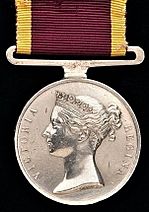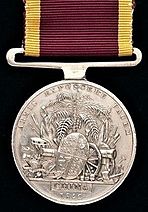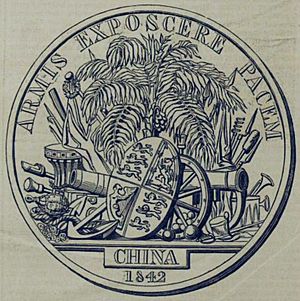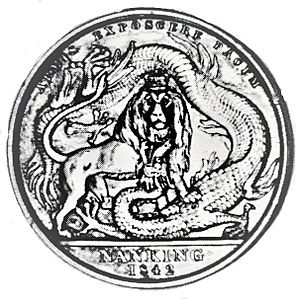China War Medal (1842) facts for kids
Quick facts for kids China War Medal |
|
|---|---|
 
Obverse and reverse of the medal.
|
|
| Type | Campaign medal |
| Eligibility | British forces |
| Awarded for | Campaign service |
| Campaign(s) | First Anglo-Chinese War (1839–42) |
| Description | Silver disk, 36mm diameter. |
| Clasps | None |
| Statistics | |
| Established | 5 January 1843 |
| Ribbon. 35mm: crimson with yellow edges | |
The China War Medal was a special award given by the British Government in 1843. It was for British and Indian soldiers and sailors. They received it for their part in the First Opium War (1839–1842). This important medal was designed by William Wyon.
Contents
Who Earned the China War Medal?
The China War Medal was first meant only for the Honourable East India Company's forces. This was in October 1842. However, in 1843, Queen Victoria made a different decision.
The British Government approved the medal for all members of the British Army, Royal Navy, and Indian Army and Navy. They had to have "served with distinction" in China. This service took place between July 5, 1840, and August 29, 1842.
Key Battles and Actions
The medal was given for taking part in several important events. These included:
- Operations in the Canton River in 1841. This included the First and Second Battle of Canton.
- The first and second capture of Chusan. These happened in 1840 and 1841.
- Battles at Amoy, Ningpo, Chinhai, Tzeki, and Chapu.
- Battles at Woosung in the Yangtze River.
- The attack on Chinkiang.
This series of events is known as the First Opium War. The war ended with the capture of Nanking. A treaty was then signed. This treaty opened five ports for trade. It also gave Hong Kong to Great Britain.
What Does the Medal Look Like?
The China War Medal is a silver disk. It is about 36 millimeters wide.
Front and Back of the Medal
- Front (Obverse): This side shows the head of Queen Victoria. She is wearing a crown. Around her head are the words "VICTORIA REGINA," which means "Queen Victoria."
- Back (Reverse): This side shows a shield. On the shield is the Royal coat of arms. Behind the shield, there is a palm tree and a collection of weapons. Above this design, it says "ARMIS EXPOSCERE PACIM." This means "By arms to demand peace." Below, it says "CHINA 1842."
This same design for the back was also used for the Second and Third China War Medals.
Original Design Idea
The very first idea for the back of the medal was different. It showed a British lion stepping on a fallen Chinese dragon. However, this design was thought to be too harsh for the Chinese people. So, the design described above was used instead. A few samples of the first design were made, though.
Ribbon and Naming
The medal hangs from a plain, straight hanger. The ribbon is about 35 millimeters wide. It is crimson (a deep red) with wide yellow edges. The crimson color stands for Great Britain. The yellow color represents the imperial color of China.
This medal did not have any clasps (metal bars added to the ribbon). The names of the people who received the medals were carved onto them. The letters were bold and capital. Stars were used to fill in any empty spaces.
Later Clasps
Some people who received this medal also qualified for the Second China War Medal in 1861. They were given a clasp that said China 1842. This clasp was meant to be added to their original medal. They also received any clasps for the second war.
However, the hangers on the two medals were different. This made it hard to attach the new clasps. So, people often just slipped the clasp over the ribbon. Sometimes, they even replaced the original ribbon with a narrower one that came with the second medal.
 | John T. Biggers |
 | Thomas Blackshear |
 | Mark Bradford |
 | Beverly Buchanan |



